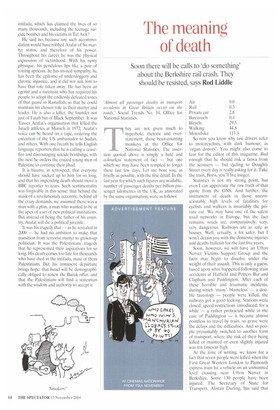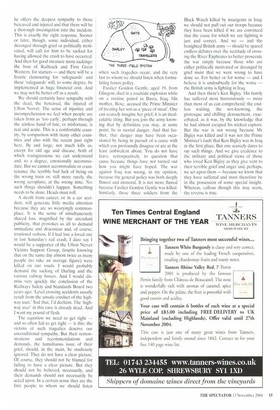The meaning of death
Soon there will be calls to 'do something' about the Berkshire rail crash. They should be resisted, says Rod Liddle 'Almost all passenger deaths in transport accidents in Great Britain occur on the roads.' Social Trends No. 34, Office for National Statistics.
hey are not given much to hyperbole, rhetoric and overstatement, those bean-counting monkeys at the Office for National Statistics. The asser tion quoted above is simply a bald and colourless statement of fact — but one which we may have been tempted to forget these last few days. Let me bore you, as briefly as possible, with the fine detail. In the last year for which such figures are available, number of passenger deaths per billion passenger kilometres in the UK, as annotated by the same organisation, were as follows: Air 0.0 Rail 0.3 Private car 2.8 Bus/coach 0.4 Bicycle 29.5 Walking 44.8 Motorbike 113.3 So now you know why taxi drivers refer to motorcyclists, with dark humour, as 'organ donors'. You might also come to fear for the editor of this magazine. Bad enough that he should risk a fatwa from the scousers but cycling to Doughty Street every day is really asking for it. Take the train, Boris, you'll live longer.
Statistics is not my strong point, but even I can appreciate the raw truth of that quote from the ONS. And further, the instrument of death in those unconscionably high levels of fatalities for cyclists and walkers is invariably the private car. We may have one of the safest road networks in Europe, but the fact remains; roads are, comparatively, very, very dangerous. Railways are as safe as houses. Well, actually, a lot safer, but I won't detain you with the domestic injuries and deaths bulletin for the last five years.
Soon, however, we will have an Ufton Nervet Victims Support Group and the facts may begin to dissolve under the weight of their assault. This is only a guess, based upon what happened following train accidents at Hatfield and Potters Bar and Clapham and Paddington. After each of these horrible and traumatic incidents, during which 'many' blameless' — a double tautology — people were killed, the railways got a good kicking. Stations were closed; speed restrictions introduced; for a while — a rather protracted while in the case of Paddington — it became almost pointless to travel by train, so grave were the delays and the difficulties. And so people presumably switched to another form of transport, where the risk of their being killed or maimed or even slightly injured was ten times as high.
At the time of writing, we know for a fact that seven people were killed when the First Great Western London to Plymouth express train hit a vehicle on an unmanned level crossing near Ufton Nervet in Berkshire. Some 130 people have been injured. The Secretary of State for Transport, Alistair Darling, has said that
he offers the deepest sympathy to those bereaved and injured and that there will be a thorough investigation into the incident. This is exactly the right response. Sooner or later, though, some individual, either deranged through grief or politically motivated, will call for him to be sacked for having allowed the crash to have occurred. And then for good measure more sackings: the boss of Railtrack and First Great Western, for starters — and there will be a frantic clamouring for 'safeguards' and these 'safeguards' will, to some degree, be implemented at huge financial cost. And we may not be better off as a result.
We should certainly have sympathy with the dead, the bereaved, the injured of Ufton Nervet. The sense of injustice and incomprehension we feel when people are taken from us `too early', perhaps through the aimless hand of fate, or misfortune, is real and acute. This is a comfortable country, by comparison with many other countries and also with the recent past right here. By and large, not much kills us, except for old age and disease, both of which transgressions we can understand and, to a degree, emotionally accommodate. But we cannot accommodate or countenance the terrible had luck of being on the wrong train or, still more rarely, the wrong aeroplane, at the wrong time. No: such things shouldn't happen. Something needs to be done. heads must roll.
A death from cancer, or in a car accident, will generate little media attention because they arc so wearyingly commonplace. It is the sense of simultaneously shared loss, magnified by the attendant publicity, that provokes us all to demand immediate and draconian and, of course, irrational redress. If I had lost a loved one in last Saturday's rail crash, I dare say I would be a supporter of the Ufton Nervet Victims Support Group, despite knowing that on the same day almost twice as many people (to take an average figure) were killed on our roads. I would probably demand the sacking of Darling and the various railway bosses. And I would dismiss very quickly the conclusion of the Railways Safety and Standards Board two years ago: 'Level crossing accidents usually result from the unsafe conduct of the highway user.' Sod that, I'd declaim. The 'highway user' in this case is already dead. And I want my pound of flesh.
The equation we need to get right and so often fail to get right is this: the victims of such tragedies deserve our unconditional sympathy. But their remonstrations and recommendations and demands, the tumultuous issue of their grief, should, in the main, be studiously ignored. They do not have a clear picture. Of course, they should not be blamed for failing to have a clear picture. But they should not be believed, necessarily, and their demands should not necessarily be acted upon. In a certain sense they are the first people to whom we should listen when such tragedies occur, and the very last to whom we should listen when formulating future policy.
Fusilier Gordon Gentle, aged 19, from Glasgow, died in a roadside explosion while on a routine patrol in Basra, Iraq. His mother, Rose. accused the Prime Minister of treating her son as a 'piece of meat'. One can scarcely imagine her grief; it is an incalculable thing. But you join the army knowing that by definition you may, at some point, be in mortal danger. And that further, that danger may have been occasioned by being in pursuit of a cause with which you profoundly disagree or are at the least ambivalent about. You do not have leave, retrospectively, to question that cause because things have not turned out how you might have hoped. The war against Iraq was wrong, in my opinion, because the general policy was both deeply flawed and immoral. It is not more flawed because Fusilier Gordon Gentle was killed. Similarly, those three soldiers from the Black Watch killed by insurgents in Iraq: we should not pull out our troops because they have been killed if we are convinced that the cause for which we are fighting is just and correct. And we — and the benighted British army — should be spared endless debates over the rectitude of crossing the River Euphrates to better prosecute the war simply because those who are either politically motivated or deranged by grief insist that we were wrong to have done so. For better or for worse — and I believe it is undoubtedly for the worse — the British army is fighting in Iraq.
And then there's Ken Bigley. His family has suffered most horrendously — more than most of us can comprehend: the endless waiting, the not-knowing, the grotesque and chilling denouement, exacerbated, as it was, by the knowledge that he had almost escaped his wicked captors. But the war is not wrong because Mr Bigley was killed and it was not the Prime Minister's fault that Ken Bigley was in Iraq in the first place. But one scarcely dares to say such things. And we give credence to the military and political views of those who loved Ken Bigley as they give vent to their terrible grief and anger and, perhaps, we act upon them — because we know that they have suffered and must therefore be in the possession of some special insight. Whereas, callous though this may seem, the reverse is true.



























































































 Previous page
Previous page